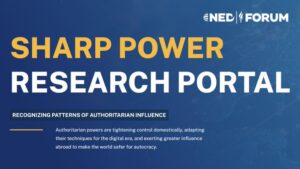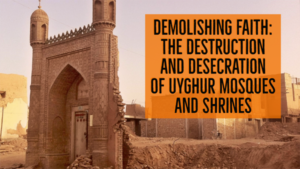Buying Influence: How China Manipulates Facebook and Twitter https://t.co/lZR8reXbPc
— Democracy Digest (@demdigest) December 20, 2021
China’s government has unleashed a global online campaign to burnish its image and undercut accusations of human rights abuses. Much of the effort takes place in the shadows, behind the guise of bot networks that generate automatic posts and hard-to-trace online personas, The New York Times reports:
Now, a new set of documents reviewed by The New York Times reveals in stark detail how Chinese officials tap private businesses to generate content on demand, draw followers, track critics and provide other services for information campaigns. That operation increasingly plays out on international platforms like Facebook and Twitter, which the Chinese government blocks at home.
In the latest case of Western tech companies collaborating with Chinese censors, Amazon quietly removed criticism of President Xi’s books by scrubbing bad reviews, ratings and comments from its Chinese site, The (London) Times reports:
The US retail giant agreed to Beijing’s demand to have anything below a five-star review of Xi Jinping’s book The Governance of China removed from Amazon.cn about two years ago, Reuters reported, citing two unidentified sources. A search of Xi Jinping returned 82 results on Amazon.cn, and the vast majority of books either written by or written about the president had the ratings and comments disabled.
 Beijing is also exploiting social media “influencers” to spread regime propaganda and enhance what the International Forum at the National Endowment for Democracy (NED) calls China’s sharp power.
Beijing is also exploiting social media “influencers” to spread regime propaganda and enhance what the International Forum at the National Endowment for Democracy (NED) calls China’s sharp power.
In effect, Beijing is using platforms like Twitter and YouTube, which the government blocks inside China to prevent the uncontrolled spread of information, as propaganda megaphones for the wider world, The Times adds:
Sympathetic foreign voices are part of Beijing’s increasingly ambitious efforts to shape the world conversation about China. The Communist Party has marshaled diplomats and state news outlets to carry its narratives and drown out criticism, often with the help of armies of shadowy accounts that amplify their posts.
“China is the new super-abuser that has arrived in global social media,” said Eric Liu, a former content moderator for Chinese social media. “The goal is not to win, but to cause chaos and suspicion until there is no real truth.”

National Endowment for Democracy (NED)
Earlier this year, a New York Times and ProPublica analysis showed how thousands of videos portraying ethnic Uyghurs living happy and free lives were a key part of an information campaign that Twitter ultimately attributed to the Chinese Communist Party, The Times adds. When Twitter took down the network behind those posts, it took down accounts linked to a contractor that it said helped shoot propaganda videos.
In a report from the Australian Strategic Policy Institute (ASPI) titled “Borrowing Mouths to Speak on Xinjiang,” Fergus Ryan, Ariel Bogle, Nathan Ruser, Albert Zhang, and Daria Impiombato tracked the spread of foreign influencers’ Xinjiang-related content online and created an interactive network diagram of the influencer ecosystem, adds China Digital Times.
“We assessed #China‘s ability to reach a particular set of elites on #Twitter, who can directly make decisions of consequence to Beijing or indirectly influence those decisions,” says @samanthajcuster at #CorridorsOfPower launch event this morning. @InternationalWM @global_wm 1/2 pic.twitter.com/bGKCVnpLZN
— AidData (@AidData) December 16, 2021







